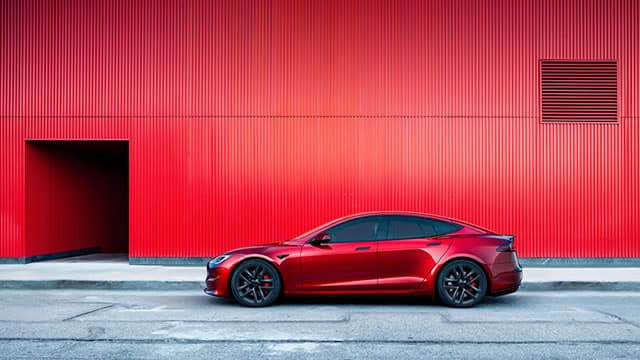Tesla Stock's 9% Robotaxi Boost Lifts Elon Musk's Net Worth By $17 Billion

Summary
Tesla's stock surged 9% on robotaxi optimism, boosting Elon Musk's net worth by $17 billion. Despite this, the initial robotaxi fleet is small compared to Musk's ambitious targets and lags behind competitors like Waymo. The article highlights the long history of unfulfilled promises and safety concerns surrounding Tesla's FSD. It provides market context, competitive analysis, and investment insights, urging investors to balance excitement with a realistic assessment of the significant technological and regulatory hurdles remaining for widespread autonomous deployment.
Tesla's Robotaxi Ambitions: A Reality Check Amidst Soaring Stock and Elon Musk's Net Worth
Tesla's recent 9% stock surge, reportedly fueled by renewed optimism surrounding its robotaxi initiatives, has significantly boosted Elon Musk's net worth by an estimated $17 billion. This surge comes as the long-awaited rollout of Tesla's driverless vehicles begins, a development that follows years of ambitious promises, unfulfilled deadlines, and persistent safety concerns surrounding its Full Self-Driving (FSD) technology. While the market's reaction suggests a renewed belief in Tesla's autonomous future, a closer examination reveals a more nuanced picture, leaving ample room for skepticism.
The Road to Autonomy: Promises vs. Reality
Elon Musk has consistently championed Tesla's FSD capabilities, often setting aggressive timelines for widespread autonomous vehicle deployment. His vision of "hundreds of thousands" of driverless vehicles operating by 2026 remains a distant aspiration. The initial Tesla robotaxi fleet, while a step forward, is a far cry from this ambitious target. For context, Alphabet's Waymo, a pioneer in autonomous driving, has already deployed roughly 100 driverless vehicles in Austin since March, demonstrating a more measured, albeit slower, approach to commercialization.
Tesla's journey into full autonomy has been fraught with challenges. Regulatory scrutiny, public skepticism regarding safety, and the technical complexities of achieving Level 4 or Level 5 autonomy have all contributed to delays. The company has faced criticism for its beta testing approach, which relies on customer feedback and real-world driving data, sometimes leading to incidents that raise questions about the technology's readiness for widespread deployment without human supervision.
Market Dynamics and Investor Sentiment
The recent stock rally underscores the significant impact that even incremental progress or positive announcements regarding FSD can have on TSLA's valuation. Investors are clearly factoring in the potential for a lucrative robotaxi network, which could unlock new revenue streams and fundamentally alter Tesla's business model from a pure automotive manufacturer to a mobility-as-a-service provider. This speculative upside often overshadows the current operational realities and the significant hurdles still to overcome.
However, it's crucial for investors to differentiate between market sentiment and tangible progress. The valuation of TSLA often reflects future growth potential rather than current profitability or established market share in autonomous driving. The stock's volatility is a testament to the high expectations placed on the company and the sensitivity to news, both positive and negative, related to its FSD and robotaxi ambitions.
Competitive Landscape and Regulatory Hurdles
The autonomous vehicle market is highly competitive, with established tech giants like Waymo and Cruise (General Motors) and numerous well-funded startups vying for market leadership. These competitors often adopt a more cautious, phased approach to deployment, prioritizing safety and regulatory compliance. Tesla's strategy, while aggressive, carries inherent risks, particularly concerning regulatory approvals and public acceptance of its technology.
Regulatory bodies globally are still developing comprehensive frameworks for autonomous vehicles. Issues such as liability in accidents, data privacy, and cybersecurity remain complex challenges that need to be addressed before widespread commercial deployment can occur. Tesla's ability to navigate this evolving regulatory landscape will be critical to the success of its robotaxi service.
Investment Insights: Navigating the Robotaxi Hype
For investors, the robotaxi narrative presents both opportunities and risks:
- Opportunity: If Tesla successfully scales its robotaxi network, it could unlock substantial new revenue streams and significantly enhance its valuation. The first-mover advantage in a truly autonomous ride-hailing service could be immense.
- Risk: The path to full autonomy is long, expensive, and uncertain. Delays, regulatory setbacks, and intense competition could temper expectations. Investors should be wary of over-reliance on future promises without concrete, scalable progress.
- Due Diligence: Investors should closely monitor Tesla's actual deployment numbers for robotaxis, regulatory approvals, and safety records. Compare Tesla's progress with that of its competitors, who may be advancing more quietly but steadily.
- Long-Term View: While short-term stock movements are influenced by news, a long-term investment in Tesla based on its robotaxi potential requires a belief in its ability to overcome significant technological, regulatory, and competitive challenges.
In conclusion, while the market's enthusiasm for Tesla's robotaxi prospects is evident in its stock performance, a pragmatic view suggests that significant milestones still need to be achieved. The journey to widespread autonomous mobility is a marathon, not a sprint, and investors should temper excitement with a realistic assessment of the challenges ahead.